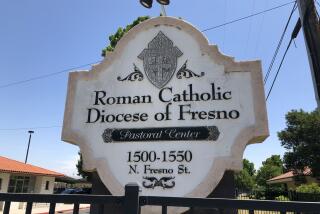Portland Church Blocked From Shielding Assets
PORTLAND, Ore. — A bankruptcy judge ruled Friday that the Archdiocese of Portland, not its parishes, owns church assets, dealing a major blow to its efforts to protect church property from lawsuits filed by alleged victims of priest sex abuse.
U.S. Bankruptcy Judge Elizabeth Perris, in a pair of opinions, ruled that church property and real estate are under the control of the archdiocese, not its individual parishes, as lawyers for the archdiocese had argued.
In July 2004, the archdiocese became the first in the nation to file for bankruptcy protection, just before the scheduled start of jury trials involving about $155 million in damages.
Since then, the archdiocese has been trying to protect church buildings and real estate from being included in settlements, arguing that the property is owned by the 124 individual parishes and a handful of schools -- not the archdiocese.
Perris, however, ruled it was clear the archdiocese held title to all property and controlled church assets.
The archdiocese, Perris wrote, has the “authority to convey real property without limitation.”
Attorneys for the accusers praised the ruling, saying it should allow the bankruptcy case to move forward.
“It’s a clear victory,” said Erin Olson, who represents some of the alleged victims.
Lawyers for the archdiocese said they were considering an appeal.
“We believe strongly the decision is not supported by the facts of the law and that it infringes on the archdiocese’s and parishioners’ rights to the free exercise of religion,” said Howard Levine, a lawyer for the archdiocese.
Perris rejected arguments that accepting the jurisdiction of a federal court might violate the 1st Amendment rights of the church to the free exercise of religion by forcing it to ignore church law on ownership.
“There is no 1st Amendment impediment to this court’s jurisdiction,” Perris wrote.
She ruled that the case was about property -- not religion.
“Who owns the property is, quite simply, not a theological or doctrinal matter,” Perris wrote. “The religious organization’s internal law is not relevant to the dispute.”
The ruling means that in principle, the archdiocese could be forced to sell off church properties to pay settlements or court awards to victims of sexual abuse. However, Perris left open the question of whether the sale of individual church properties could pose an unfair burden on the practice of religion under the Religious Freedom and Restoration Act of 1993.
Her ruling supports an earlier decision in the bankruptcy proceedings of the Diocese of Spokane in Washington state, which sought protection from creditors shortly after the Archdiocese of Portland filed.
In the Washington case, U.S. Bankruptcy Judge Patricia Williams said Spokane Bishop William S. Skylstad agreed to abide by federal law when he voluntarily entered the diocese into bankruptcy, and could not claim that property ownership must be decided by church law.
More to Read
Sign up for Essential California
The most important California stories and recommendations in your inbox every morning.
You may occasionally receive promotional content from the Los Angeles Times.










